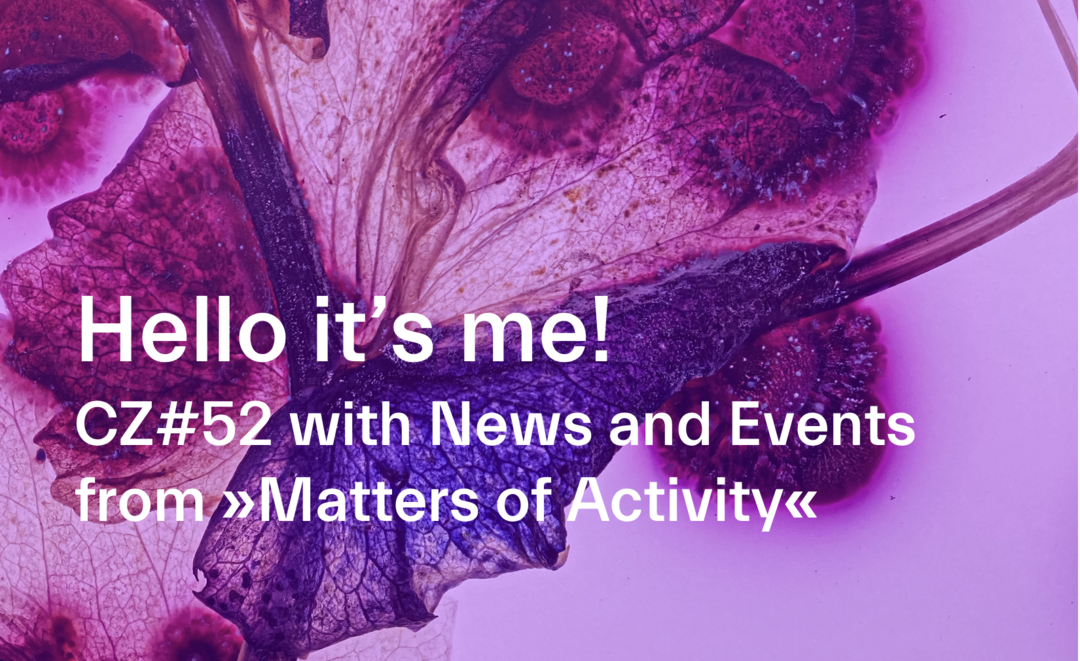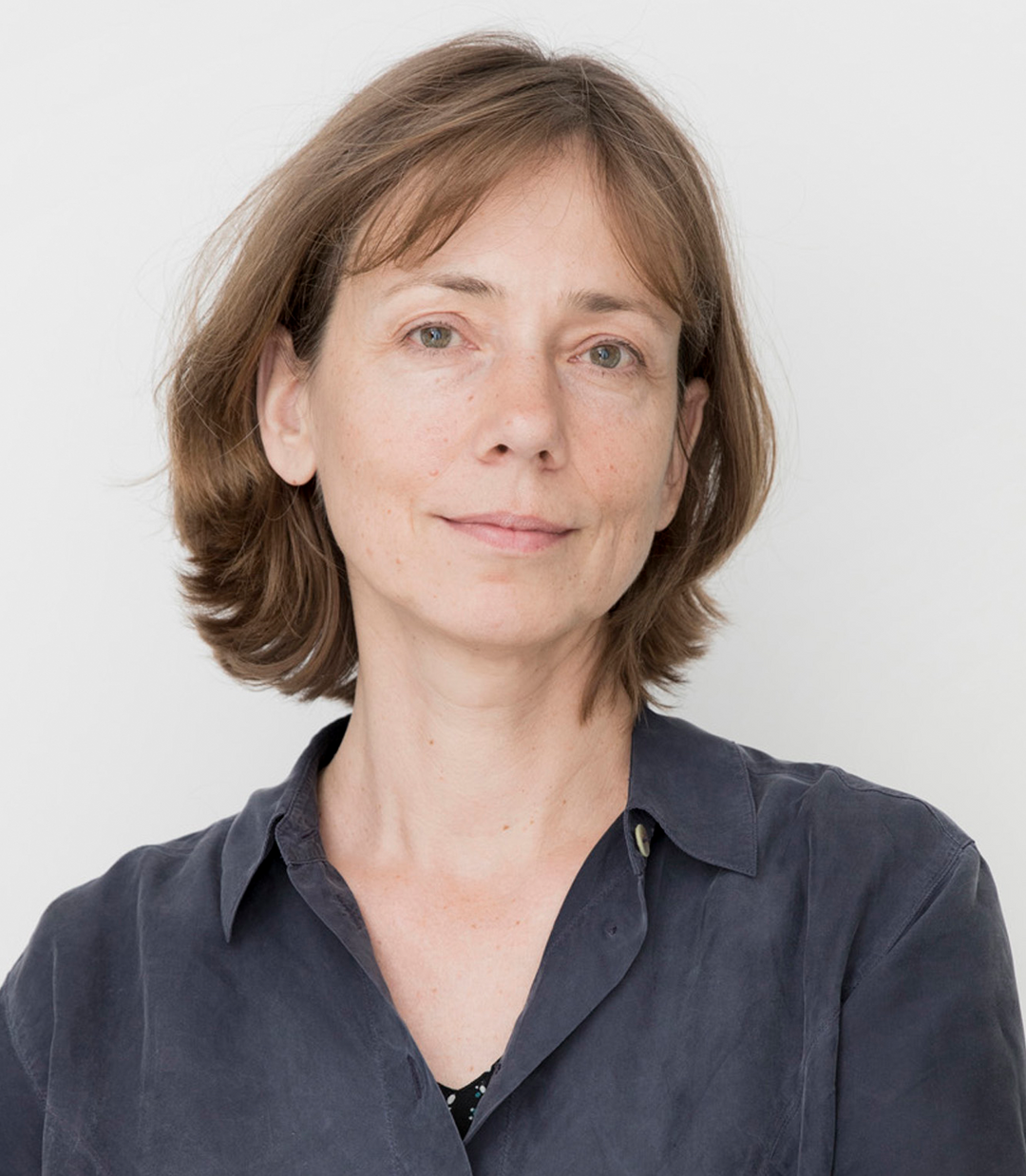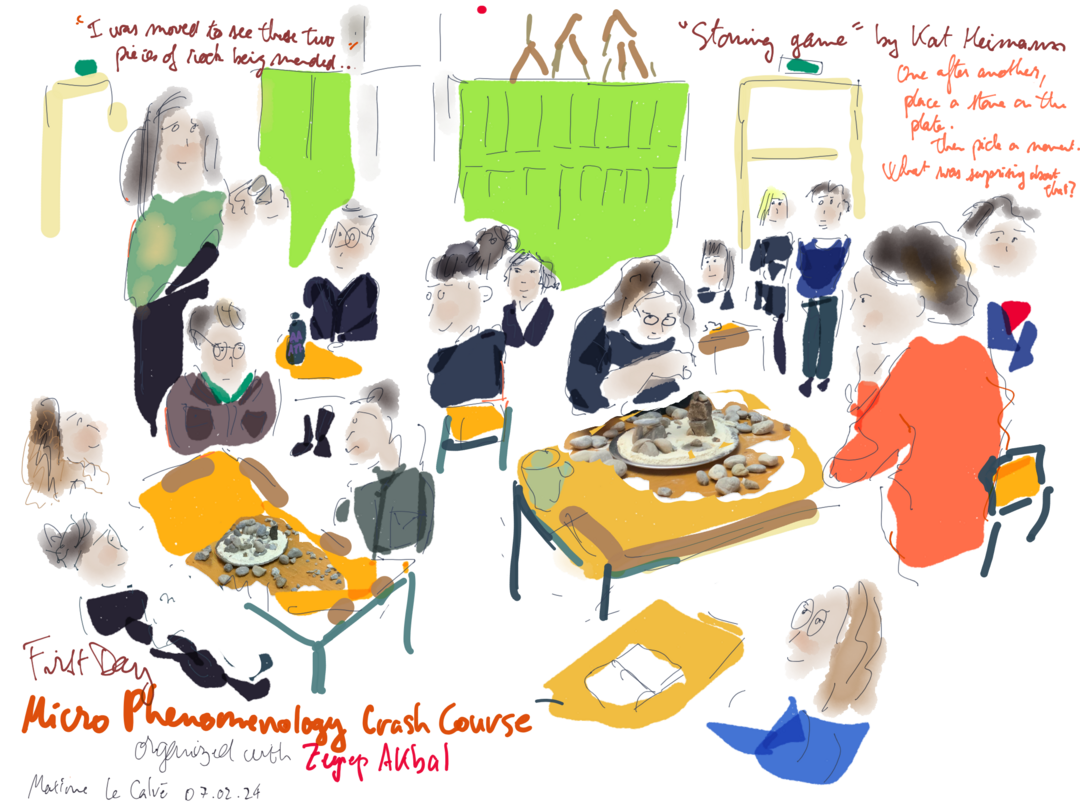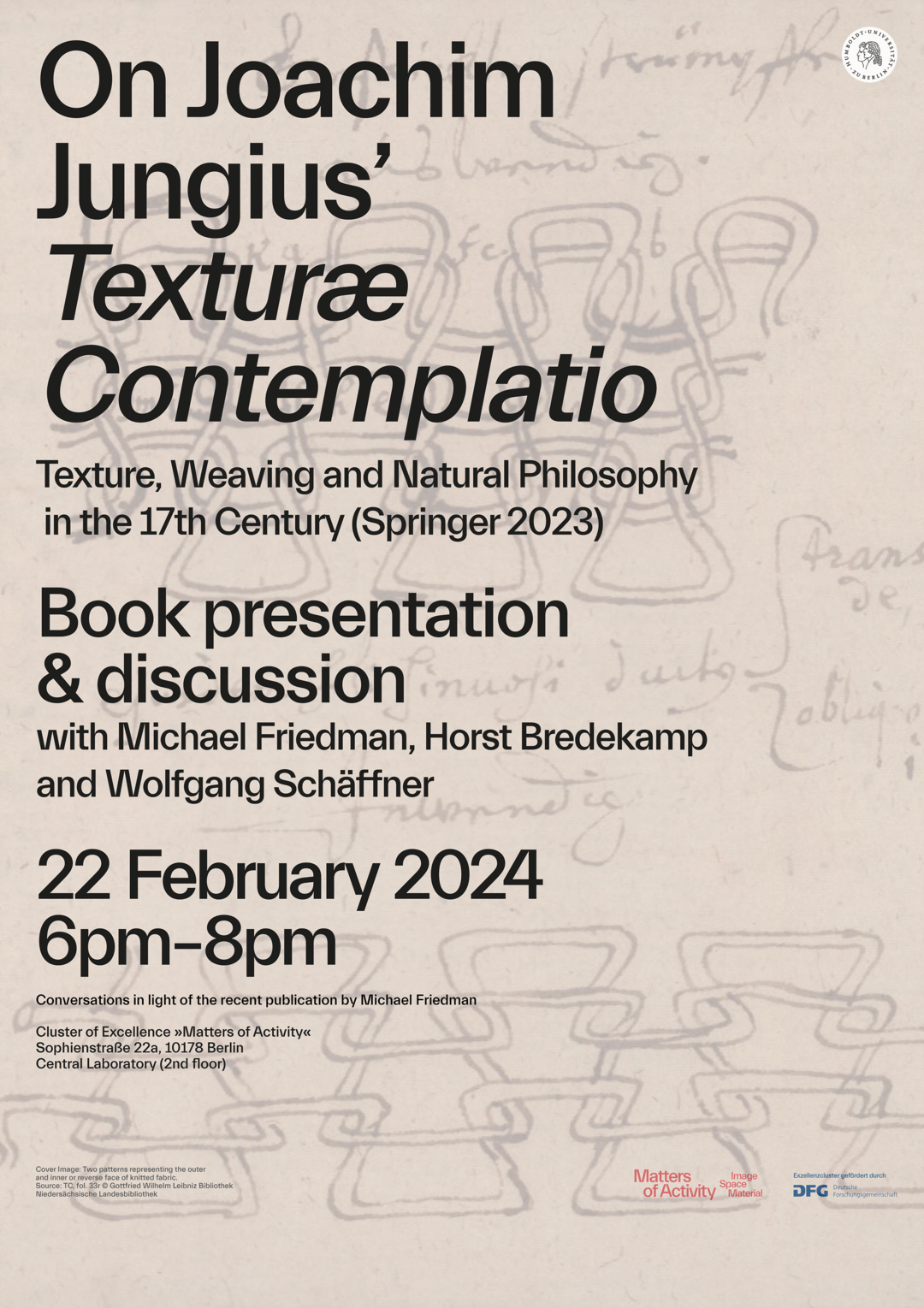|
|
 |
 |
|
|

|
 |
»Microverse« by Kathrin Linkersdorff, in Cooperation with Regine Hengge. Copyright: Kathrin Linkersdorff, adapted by Matters of Activity
|
|
Dear Friends of »Matters of Activity«,
The year has already picked up some speed and the first events have passed successfully. We are particularly pleased to document some of our members' latest achievements in this issue. In February, we are looking forward to two special book launches: First, on February 22nd, Michael Friedman will present his latest study on Joachim Jungius - the first book to cover the unique encounters between weaving and mathematics at early modern Europe. Secondly, »Material Trajectories - Designing with Care?«, edited by MoA members Léa Perraudin, Clemens Winkler and Claudia Mareis, and Matthias Held, will launch on February 23rd as part of the Future Ecologies series by Meson Press, which is edited by Petra Löffler, Claudia Mareis and Florian Sprenger.
We would also like to draw your attention to the magnificent catalog accompanying the exhibition by photographer Kathrin Linkersdorff at Phoxxi - The Temporary House of Photography, that ended just a few days ago. The Microverse series, which was created in Regine Hengge's laboratory, is hopefully just the beginning of a more intensive collaboration.
Enjoy reading!
Antje Nestler, Carolin Ott & Franziska Wegener
|
 |
|
Liebe Freund:innen von »Matters of Activity«,
das Jahr hat bereits an Fahrt aufgenommen und die ersten Events sind erfolgreich über die Bühne gegangen. Wir freuen uns, auch in dieser Ausgabe auf die jüngsten Errungenschaftem unserer Mitglieder, wie etwa neue Veröffentlichungen, hinzuweisen. Der Februar zeichnet sich durch zwei besondere Buchpräsentationen aus: Am 22. Februar findet die Vorstellung von Michael Friedmans neuester Studie zu Joachim Jungius statt - das erste Buch, das die einzigartigen Begegnungen zwischen Weberei und Mathematik im Europa der frühen Neuzeit behandelt. Am 23. Februar wird die Publikation »Material Trajectories - Designing with Care?« präsentiert, herausgegeben von den MoA-Mitgliedern Léa Perraudin, Clemens Winkler und Claudia Mareis, sowie von Matthias Held. Der Band ist Teil der Future Ecologies series bei Meson Press, herausgegeben von Petra Löffler, Claudia Mareis und Florian Sprenger. Schließlich möchten wir auf den prachtvollen Band zur Ausstellung der Fotografin Kathrin Linkersdorff hinweisen, die vor wenigen Tagen im Phoxxi - Haus der Photografie Temporär in Hamburg zu Ende gegangen ist. Die Serie »Microverse«, entstanden im Labor von Regine Hengge, ist hoffentlich nur der Anfang einer intensiveren Zusammenarbeit.
Viel Spaß bei der Lektüre!
Antje Nestler, Carolin Ott & Franziska Wegener
|
 |
|
|
|
|
 |
| Into the Microverse |
| Impressions from the MoA Excursion to Kathrin Linkersdorff's Exhibition in Hamburg |
 |
|
|
 |
| 1-3: Excursion to Hamburg. Copyright: Matters of Activity, 4: Cover »Kathrin Linkersdorff. Works«, Hartmann Books 2024. |
 |
|
On Friday, January 19th, a small group of MoA members made their way to Hamburg to visit Kathrin Linkersdorff's exhibition at the Phoxxi – The Temporary House of Photography, despite adverse weather conditions and very late trains. Guests were able to enjoy a special guided tour by artist-photographer Kathrin Linkersdorff, microbiologist Regine Hengge, and curator Ingo Taubhorn. The tour focused on the works from the Microverse series, created over the past few months during Linkersdorff's artist-in-residence stay in Regine Hengge's laboratory at the Humboldt-Universität zu Berlin. In front of the original works, the group was able to discuss questions raised during the BBB lecture in the Cluster in December. For those who did not make it to the exhibition, the accompanying ↗ book with contributions by Regine Hengge, Karin Leonhard, and a conversation with Kathrin Linkersdorff by Brigitte Woischnik and Ingo Taubhorn is highly recommended.
|
 |
|
|
|
|
 |
| Activarium |
| Visit MoA's New Showroom and Workspace Now! |
 |
|
|
 |
| MoA Activarium. Copyright: Matters of Activity |
 |
|
With the »Activarium«, we want to actively engage with potential partners from the industry, start-ups, NGOs, politics and society as a whole to initiate an exploratory exchange on active materials, bio- and culture-inspired innovation as well as sustainability approaches. We want visitors to experience our prototypes to make MoA’s intentions and research tangible and accessiblee. The »Activarium« serves as a work-in-progress showcase of different research strands and processes. Our visitors can dive into the research as it's happening, before its published results. MoA’s transdisciplinary research approach, which is based on ideas such as critical making and speculative design, enables reflections on common questions that hold the potential to contribute to the transition towards a more sustainable, resilient, and just culture of materials and to stimulate speculations about other ways of living and world-making.
The first »Activarium« installation, which opened November 8th, 2023 during Berlin Science Week focuses on architecture, alternative building materials, sustainable bio-inspired design, and our agency in (museum) spaces. Come visit!
Team & Contact
→ Antje Nestler (Science Communication)
→ Julia Blumenthal (Design Lab)
→ Kerstin Germer (Academic Management)
moa.activarium@hu-berlin.de
Opening Hours (starting February 13th)
Walk-in and experience (no prior reservation needed for groups of less than 5 people):
Tuesdays, 10.00 am – 12.15 pm
Thursdays, 2.00 pm – 4.00 pm
Are you a group of more than 5 people or do the opening hours not fit your schedule? Please contact us via moa.activarium@hu-berlin.de to schedule a visit! → more
|
 |
|
|
|
|
 |
| Strangely Familiar Arrivals |
| Sabine Marienberg hält Vortrag im Rahmen der Ringvorlesung »Global Exocultures and UFO Conspiracies« |
 |
|
|

|
 |
|
31.1.2024
|
 |
|
Symbolic Material Fiktive Begegnungen mit Außerirdischen werden von lebensweltlichen Zusammenhängen aus entworfen, die uns vertraut sind und reichen von Ähnlichkeiten über Unterschiede bis hin zur Unverständlichkeit. Die Frage, wie sich mit Wesen kommunizieren ließe, die ganz anders und vielleicht ja doch so sind wie wir, unterscheidet sich nicht wesentlich von derjenigen, wie Angehörige verschiedener Kulturen und Sprachgemeinschaften einander verstehen können, wenn auf keinen gemeinsamen Rahmen zurückgegriffen werden kann. Das Abenteuer einer solchen rückhaltlosen Übersetzung eröffnet die Möglichkeit, durch die fremde Sprache etwas über die eigene zu lernen – und nicht zuletzt über unsere Grundannahmen, was Sprache eigentlich ausmacht. Im Rahmen der Ringvorlesung »Global Exocultures and UFO Conspiracies« spricht Clustermitglied Sabine Marienberg am Mittwoch, den 31. Januar 2024, am Romanistischen Institut der Heinrich-Heine-Universität Düsseldorf.
→ more
|
 |
|
|
|
|
 |
| Micro-Phenomenology Crash Course |
| Detailed Workshop Report Out Now |
 |
|
|

|
 |
Micro Phenomenology Crash Course, Workshop 7-9 February 2024, Stone game by Katrin Heimann. Copyright: Maxime Le Calvé.
|
|
7.2.2024–9.2.2024
|
 |
|
Object Space Agency | XR | Graphic Anthropology From February 7-9th, 2024, the Micro-Phenomenology Crash Course, instructed by Katrin Heimann, Associate Professor at the School of Culture and Society - Interacting Minds Centre of Aarhus University, took place at the Cluster. The event, organized by MoA members Maxime Le Calvé and Zeynep Akbal, had to objectives: first, providing participants with tools to dissect intricate first-person experiences of all kinds, secondly, analyzing collectively the benefits and the challenges of VR and Mixed Reality experiences to bridge art and science.
→ more
|
 |
|
|
|
|
 |
| Texture, Weaving and Natural Philosophy in the 17th Century |
| Michael Friedman Presents 1st Transcription, Translation and Study of Jungius' Unpublished Manuscript »Texturæ Contemplatio« |
 |
|
|

|
 |
Copyright: Matters of Activity
|
|
22.2.2024
|
 |
|
Weaving | Textiles | Publications Michael Friedman's book offers an analysis of Joachim Jungius' »Texturæ Contemplatio« - a hitherto-unpublished manuscript written in German and Latin that deals with weaving, knitting and other textile practices, attempting to present as well various fabrics and textile techniques in a scientifical and even mathematical framework. The book aims to provide the epistemological, technical and historic framework for Jungius’ manuscript, inspecting fabrics, weaving techniques as well as looms and other textile machines in the Holy Roman Empire during the Early Modern Period. It also offers a unique investigation of the notion and metaphor of ›texture‹ during this period, and explores, within the wider context of the ›meeting‹ or ›trading zones‹ thesis, the relations between artisans and natural philosophers during the 17th century. Save the date for the Book Presentation on Thursday, February 22nd, 2024.
→ more
|
 |
|
|
|
|
|